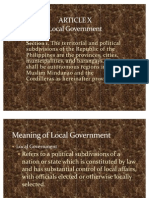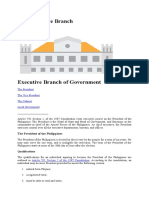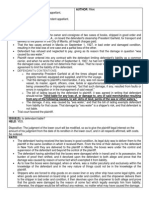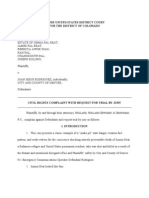Article V - Suffrage
Article V - Suffrage
Uploaded by
Eduard EugenioCopyright:
Available Formats
Article V - Suffrage
Article V - Suffrage
Uploaded by
Eduard EugenioOriginal Title
Copyright
Available Formats
Share this document
Did you find this document useful?
Is this content inappropriate?
Copyright:
Available Formats
Article V - Suffrage
Article V - Suffrage
Uploaded by
Eduard EugenioCopyright:
Available Formats
Article V SUFFRAGE
SECTION 1. Suffrage may be exercised by all citizens of the Philippines not otherwise disqualified by law, who are at least eighteen years of age, and who shall have resided in the Philippines for at least one year and in the place wherein they propose to vote for at least six months immediately preceding the election. No literacy, property, or other substantive requirement shall be imposed on the exercise of suffrage. Meaning of Suffrage. Suffrage is the right and obligation to vote of qualified citizens in the election of certain national and local officers of the government and in the decision of public questions submitted to the people. Nature of Suffrage. (1) A mere privilege. Suffrage is not a natural right of the citizens but merely a privilege to be given or withheld by the law making power subject to constitutional limitations. (2) A political right. Suffrage enables every citizen to participate in the process of government to assure that it can truly be said to derive its powers from the consent of the governed. The principle is that of one man, one vote. Scope of Suffrage. Suffrage include: (1) Election. It is the means by which the people choose their officials for definite and fixed periods and to whom they entrust, for the time being as their representatives, the exercise of powers of government; (2) Plebiscite. It is the name given to a vote of the people expressing their choice for or against a proposed law or enactment submitted to them. In the Phil., the term is applied to an election at which any proposed amendment to, or revision of, the Constitution is submitted to the people for their ratification. Plebiscite is likewise required by the Constitution to secure the approval of the people directly affected before certain proposed changes affecting local government units may be implemented. (3) Referendum. It is the submission of a law or part thereof passed by the national or local legislative body to the voting citizens of a country for their ratification or rejection. (4) Initiative. It is the process whereby the people directly propose and enact laws. (5) Recall. It is a method by which a public officer may be removed from office during his tenure or before the expiration of his term by a vote of the people after registration of a petition signed by a required percentage of the qualified voters. Qualification of voters. He must be: (1) (2) (3) (4) A citizen (male or female) of the Phil.; Not otherwise disqualified by law; At least eighteen (18) years of age; and Have resided in the Phil. for at least one (1) year and in the place wherein he proposes to vote for at least six (6) months preceding the election.
Age qualification. (1) Minimum age. There must be some minimum age for voting.
(2) Basis. This suffrage qualification is based on the assumption that under a certain age, human beings do not have the maturity, experience, education, and sense of judgement that will enable them to vote with any reasonable degree of intelligence. (3) No maximum age limit. No general agreement exists as to the exact age at which individual supposedly attains the maturity sufficient for political participation. Residence qualification. (1) Period of residence. A voter must have been a permanent resident of the Philippines for at least one (1) year preceding the election and six (6) months in the province, city, or municipality where he is a voter. (2) Importance. Six (6) months of residence is considered the minimum length of time within which a person can adequately familiarize himself with the needs and conditions and the personalities of the locality. Persons disqualified to vote. (1) Any person who has been sentenced by final judgment to suffer imprisonment for not less than one (1) year, but such person shall automatically require to vote upon expiration of five (5) years after service of sentence. (2) Any person who has been adjudged by final judgment by competent court or tribunal of having committed any crime disloyalty to the duly constituted government. (3) Insane or incompetent persons as declared by competent authority. Arguments justifying the lowering of voting age from 21 to 18. (1) It has the effect of broadening the base of democratic participation in the political process; (2) The voting age of 21 years is as old as the Roman Empire; therefore, it is obsolete; (3) It is the (alleged) findings of medical science that todays 18-year-old is physically at least 3 years ahead of an 18-year-old of 1900; (4) The communication media explosion has resulted in making 18-year-old citizens better informed than their parents; (5) The Phil. is becoming an increasingly young country and the youth are more idealistic and are more change-oriented than their elders; (6) The objection that 18-year-old citizens lack the maturity to exercise an important political right widely is at best a debatable question; (7) If at the age of 18 one can enter into a marriage contract, which is the most important in the life of a person, there is no reason why an 18-year-old should not be permitted to vote; (8) If at the age of 18 one is mature enough to fight in the defence of his country, he is old enough to be given a voice in the determination of its public policy; (9) By including those under 12 but at least 18 to vote will make them feel that they are part of the decision making process and thereby at least increase their loyalty to our institution; and (10) Voting is the major if not the sole participation of common citizens in the political process of the state. Arguments justifying removal of literacy requirement. This requirement confuses literacy with intelligence and learning whit wisdom. Some 28% of our people roughly about 4.3 million among us who are more than 21 years old are illiterates. They cannot read newspapers or magazines but they listen to radio; they join conversation and discussions with their neighbours; they know what is happening in their community and in the country. Yet they are denied the right to take part in their government and to help shape their destiny Property requirement prohibited.
(1) Property ownership not a test of an individuals capacity. It does not detract the mans capacity to function properly and fully as a social and political being. (2) Property requirement inconsistent with concept of republican government. The imposition of property qualifications on the voters would be inconsistent with the very nature and essence of our republican system of government ordained in our Constitution. (3) Property requirement inconsistent with social justice principle. Social justice presupposes equal opportunity for all, rich and poor alike. Other substantive requirements prohibited. (1) Education. As a general principle, the more education a man has, the better and more valuable member of the society he will be. (2) Sex. There would seem to be no adequate or justifiable basis for depriving women of equal voting rights with men. (3) Taxpaying ability. This restriction is related for property requirement for voting. Compulsory suffrage. Should voting be made compulsory? (1) Arguments against compulsory suffrage. Those who are against any system of coercive voting say that it is not only undemocratic but that no useful purpose would be served by dragging the people to the polls against their will. (2) Arguments in favour of compulsory suffrage. The proponents of compulsory suffrage contend that requirements that would force an apathetic individual to the polls would make him aware of the responsibility that rests on him and would encourage him to become acquainted with the issues and personalities involved in the election. SECTION 2. The congress shall provide a system for securing the secrecy and sanctity of the ballot as well as a system for absentee voting by qualified Filipinos abroad. The Congress shall also design a procedure for the disabled and the illiterates to vote without the assistance of other persons. Until then, they shall be allowed to vote under existing laws and such rules as the Commission on Elections may promulgate to protect the secrecy of the ballot. System for securing the secrecy and sanctity of the ballot. (1) Untrammelled exercise of the right to vote. It is right without which the principle of sovereignty residing in the people. (2) Voting by the disabled and illiterates. With the enfranchisement of the illiterates and the existence of many disabled voters, this responsibility of the legislative body assumes more importance. a. Congress will have to enact a law prescribing procedures that will enable the disabled and the illiterates to secretly cast their ballots without requiring the assistance of other persons. b. Until Congress provides for the appropriate procedure, they shall be allowed to vote under the existing law and such rules as the Commission on Election may promulgate to protect the secrecy of the ballot. System for absentee voting by qualified Filipinos abroad. Section 2 extends the right of suffrage even to Filipinos abroad provided they possess all the qualifications mentioned therein and none of the disqualifications provided by law.
You might also like
- Reviewer - SEPARATION-Delegation of POWERSDocument5 pagesReviewer - SEPARATION-Delegation of POWERS8LYN LAW100% (5)
- Kinds of GovernmentsDocument9 pagesKinds of GovernmentsNoel IV T. Borromeo100% (2)
- Philippine Constitution Article 4 and 5 SummaryDocument7 pagesPhilippine Constitution Article 4 and 5 SummaryCandace AguilarNo ratings yet
- Electoral System: Philippines: Government TypeDocument2 pagesElectoral System: Philippines: Government TypeDolly RizaldoNo ratings yet
- Article 7 The Executive DepartmentDocument63 pagesArticle 7 The Executive Department'Bernan Esguerra Bumatay100% (16)
- Notes On Philippine CitizenshipDocument3 pagesNotes On Philippine Citizenshipancaye1962100% (1)
- Three Branches of The Philippine GovernmentDocument2 pagesThree Branches of The Philippine GovernmentCJ Etneicap86% (7)
- Constitutional Law and ConstitutionDocument5 pagesConstitutional Law and Constitutionancaye1962No ratings yet
- Premium Pet Health v. All American Pet ProteinsDocument13 pagesPremium Pet Health v. All American Pet ProteinsKathrynRubinoNo ratings yet
- Suffrage and Its ScopeDocument9 pagesSuffrage and Its ScopeMichelle Gonzales Caliuag100% (4)
- The Constitutional CommissionsDocument4 pagesThe Constitutional CommissionsJilliane Oria80% (10)
- ARTICLE IV Citizenship-ReviewerDocument9 pagesARTICLE IV Citizenship-ReviewerAnna Katrina Quanico100% (1)
- Article Vi - The Legislative Department ReviewerDocument5 pagesArticle Vi - The Legislative Department ReviewerKim Laurente-Alib100% (1)
- Article IVDocument39 pagesArticle IV'Bernan Esguerra Bumatay100% (3)
- Legislative Department ReviewerDocument9 pagesLegislative Department ReviewerMichaella Reyes100% (6)
- History of Political Parties in The PhilippinesDocument9 pagesHistory of Political Parties in The PhilippinesKurt Ryan Jesura100% (1)
- The Philippines Is A Democratic and Republican StateDocument5 pagesThe Philippines Is A Democratic and Republican StateKathleen A. Pascual100% (1)
- ARTICLE VI Legislative DepartmentDocument30 pagesARTICLE VI Legislative DepartmentKimber Palada100% (4)
- Argumentative EssayDocument16 pagesArgumentative EssayJhona Rivo Limon67% (3)
- Reviewer Executive DepartmentDocument18 pagesReviewer Executive Departmentdoraemon100% (1)
- ARTICLE 8 ReviewerDocument8 pagesARTICLE 8 ReviewerMigoy DANo ratings yet
- Qualifications of Public OfficialsDocument6 pagesQualifications of Public OfficialsJessamine Orioque100% (1)
- Fundamentals of PolSciDocument33 pagesFundamentals of PolScidomermacanangNo ratings yet
- How Does A CPN Number and SCN Number WorkDocument3 pagesHow Does A CPN Number and SCN Number WorkShape My Credit100% (1)
- Cockfighting OrdinanceDocument4 pagesCockfighting OrdinanceEden Celestino Sarabia Cacho100% (1)
- 2014 Corporate Law Learning GuideDocument119 pages2014 Corporate Law Learning GuideTony Zhou100% (1)
- Suffrage Article VDocument22 pagesSuffrage Article VGab Naparato100% (1)
- SuffrageDocument21 pagesSuffragemaricrisandemNo ratings yet
- 1987 Philippine Constitution, Article VDocument17 pages1987 Philippine Constitution, Article VTessa De Claro100% (1)
- Article Iv-CitizenshipDocument18 pagesArticle Iv-CitizenshipLizette Sy25% (4)
- Political Party and Party-List SystemDocument16 pagesPolitical Party and Party-List SystemAlvin Clari100% (2)
- PreambleDocument6 pagesPreamblemaria erika100% (7)
- Power of The PresidentDocument3 pagesPower of The PresidentJose Li To100% (6)
- Political Parties in The PhilippinesDocument2 pagesPolitical Parties in The PhilippinesCJ EtneicapNo ratings yet
- Module #8 - Article 7 - Executive Branch PPG PDFDocument5 pagesModule #8 - Article 7 - Executive Branch PPG PDFkimberson alacyang100% (1)
- Anti-Dynasty Law Position PaperDocument1 pageAnti-Dynasty Law Position PaperJohnna Uy0% (1)
- Qualification and DisqualificationDocument7 pagesQualification and Disqualificationjovani ema100% (2)
- Article VIII The Judicial DepartmentDocument26 pagesArticle VIII The Judicial Departmentdan malapira100% (2)
- Citizenship ReviewerDocument4 pagesCitizenship Reviewerroansalanga100% (2)
- Article VIII Judicial Department PDFDocument22 pagesArticle VIII Judicial Department PDFpatricia.aniya67% (3)
- Roles and Obligations of The Philippine JudiciaryDocument49 pagesRoles and Obligations of The Philippine Judiciaryapril joy viernesNo ratings yet
- Dual Citizenship Vs Dual AllegianceDocument1 pageDual Citizenship Vs Dual AllegianceJan Diao100% (1)
- Article 2 Declaration of Principles and State PoliciesDocument3 pagesArticle 2 Declaration of Principles and State PoliciesKris Borlongan100% (1)
- Meaning and Elements of StateDocument2 pagesMeaning and Elements of StateJeje NutNo ratings yet
- Cases in Constitutional Law II Article III Bill of RightsDocument318 pagesCases in Constitutional Law II Article III Bill of RightsDawn Jessa Go100% (3)
- Article VI Legislative DepartmentDocument87 pagesArticle VI Legislative DepartmentDjumeil Gerard TinampayNo ratings yet
- Introduction To Political ScienceDocument3 pagesIntroduction To Political ScienceElle100% (1)
- Fundamental Powers of The StateDocument10 pagesFundamental Powers of The StateTrizha Reamico100% (3)
- Article 11Document26 pagesArticle 11dan malapira100% (1)
- Comelec HistoryDocument3 pagesComelec HistoryJomel Manaig100% (4)
- D. Executive Department: I. Privileges, Inhibitions and DisqualificationsDocument23 pagesD. Executive Department: I. Privileges, Inhibitions and DisqualificationsReynaldo Fajardo YuNo ratings yet
- Article VI (6) of The Philippine Constitution ReviewerDocument4 pagesArticle VI (6) of The Philippine Constitution ReviewerMigoy DANo ratings yet
- The Judicial BranchDocument42 pagesThe Judicial BranchLeslie S. AndresNo ratings yet
- Consti Reviewer Constitutional CommissionDocument7 pagesConsti Reviewer Constitutional CommissionRudiver Jungco JrNo ratings yet
- Lesson 9 Functions of The Judicial BranchDocument23 pagesLesson 9 Functions of The Judicial BranchLeah Joy Valeriano-Quiños100% (1)
- Essential Parts of A Good Written ConstitutionDocument1 pageEssential Parts of A Good Written ConstitutionAnne Desal100% (1)
- ARTICLE X Local GovernmentDocument42 pagesARTICLE X Local Governmentnlepasana41570% (23)
- De Jure and de Facto GovernmentDocument1 pageDe Jure and de Facto GovernmentMhali67% (3)
- ARTICLE VI - Legislative DepartmentDocument12 pagesARTICLE VI - Legislative DepartmentStephanie Dawn Sibi Gok-ong80% (5)
- PoliticsDocument27 pagesPoliticsjami bernardoNo ratings yet
- The Executive BranchDocument13 pagesThe Executive BranchizzelNo ratings yet
- Share 'SuffrageDocument3 pagesShare 'SuffrageArton BacdayanNo ratings yet
- ARTICLE V SUFFRAGE Nature of SuffrageDocument3 pagesARTICLE V SUFFRAGE Nature of SuffrageVerine SagunNo ratings yet
- The Right of SuffrageDocument39 pagesThe Right of SuffrageMae Ann ClaveronNo ratings yet
- Liwayway v. FortuneDocument2 pagesLiwayway v. FortuneAaron AristonNo ratings yet
- Nuez V Cruz Apao 455 Scra 228Document2 pagesNuez V Cruz Apao 455 Scra 228Earvin SunicoNo ratings yet
- Persons 19 Reyes V Ines LucianoDocument2 pagesPersons 19 Reyes V Ines LucianoDymphna Ann CalumpianoNo ratings yet
- Kenya 2 Subteam 2 CHUI Development of A Legal and Regulatory Framework For E-Government in KenyaDocument43 pagesKenya 2 Subteam 2 CHUI Development of A Legal and Regulatory Framework For E-Government in KenyaICT AUTHORITYNo ratings yet
- Porter v. Wertz: What Are The Facts of This Case?Document17 pagesPorter v. Wertz: What Are The Facts of This Case?Missy MeyerNo ratings yet
- Small Coins Act 1971Document3 pagesSmall Coins Act 1971Milinda SenguptaNo ratings yet
- Commissioner of Internal RevenueDocument3 pagesCommissioner of Internal RevenueKath LeenNo ratings yet
- Indian Constitution: Presenter: Indu Bala Moderator: Ms. Amali Mery Nursing Tutor, Aiims, RishikeshDocument60 pagesIndian Constitution: Presenter: Indu Bala Moderator: Ms. Amali Mery Nursing Tutor, Aiims, RishikeshIndu Bala100% (1)
- UnpublishedDocument23 pagesUnpublishedScribd Government DocsNo ratings yet
- EEOC v. Sidley Austin Brown. - Document No. 89Document4 pagesEEOC v. Sidley Austin Brown. - Document No. 89Justia.comNo ratings yet
- CRT FormDocument3 pagesCRT FormAnonymous zyIfM5SNo ratings yet
- Albano and Alcantara NotesDocument1 pageAlbano and Alcantara NotesedrearamirezNo ratings yet
- Capablanca Vs BasDocument2 pagesCapablanca Vs BasFloramie Romero100% (2)
- En Banc Juanito A. Garcia and Alberto J. Dumago, Petitioners, G.R. No. 164856Document19 pagesEn Banc Juanito A. Garcia and Alberto J. Dumago, Petitioners, G.R. No. 164856Wilfredo MolinaNo ratings yet
- United States v. Rashard Cleveland, 4th Cir. (2015)Document3 pagesUnited States v. Rashard Cleveland, 4th Cir. (2015)Scribd Government DocsNo ratings yet
- Aff. Daneco-Not ResidentDocument3 pagesAff. Daneco-Not Residenthudor tunnelNo ratings yet
- Cir vs. Metro Super Rama DigestDocument3 pagesCir vs. Metro Super Rama DigestClavel TuasonNo ratings yet
- Urban Landholding Registration Proclamation.818-2014Document25 pagesUrban Landholding Registration Proclamation.818-2014geospatial planNo ratings yet
- Unit - Iv Rights and Duties of AdvocateDocument25 pagesUnit - Iv Rights and Duties of AdvocateVicky DNo ratings yet
- Digest Albania vs. TalladoDocument1 pageDigest Albania vs. TalladoKriselle Joy ManaloNo ratings yet
- 023 Mirasol v. Robert Dollar Co DigestDocument2 pages023 Mirasol v. Robert Dollar Co Digestthornapple250% (1)
- Jimma Reat ComplaintDocument36 pagesJimma Reat ComplaintMichael_Lee_RobertsNo ratings yet
- Uzbekistan0914 ForUpload 0Document130 pagesUzbekistan0914 ForUpload 0Angelo-Daniel SeraphNo ratings yet
- Law 12 Final Exam Study Guide UploadDocument13 pagesLaw 12 Final Exam Study Guide UploadnveverettNo ratings yet
- Linsangan v. Tolentino DigestDocument2 pagesLinsangan v. Tolentino DigestAngeline Rodriguez100% (4)
- Rizal Surety Vs CA July 18, 2000Document2 pagesRizal Surety Vs CA July 18, 2000Alvin-Evelyn GuloyNo ratings yet

























































































